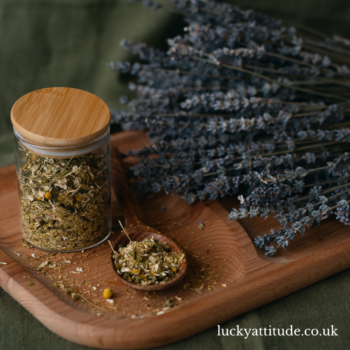7 Botanical Remedies That Relieve Anxiety

Anxiety is a mental health condition characterised by continuous excessive fear or worry.
Anxiety is the most common mental disorder in the world affecting 301 million people (according to World Health Organisation), most of them are women.
Anxiety can manifest in various forms, from generalised anxiety disorder (GAD) to PTSD, specific phobias, and social anxiety disorder.
Young adults, particularly Gen Z, are more likely to experience anxiety or depression, according to a US government study.
Anxiety affects every aspect of an individual’s life, from personal relationships to professional productivity.
Unfortunately, only about 1 in 4 people with anxiety disorders receive treatment.
How to treat anxiety
Seek help if your anxiety starts to affect your everyday life.
Alongside professional help, try various mindfulness and relaxation techniques until you find something that works for you.
GP may refer you to cognitive therapy, exposure therapy, structured problem-solving, medication, and support groups. You may also want to contact functional medicine doctor, who will use a more holistic approach to identify the root cause of your problem. They will look at your physical, mental, and emotional health, and prescribe a lifestyle change, if you will.
You can also try supplementary natural remedies at home.
Natural remedies for reducing anxiety at home
Botanical extracts have been gaining attention for their potential in alleviating anxiety symptoms.
Various herbs stand out due to their increasing popularity and research-backed anxiety-relieving effects.
1. Lavender oil
Smelling soothing plant essential oils can help to ease stress and anxiety. Certain scents work better for some people than others, so consider experimenting with various options.
This research suggests that lavender may be especially helpful in treating anxiety disorders. Lavender is widely recognized for its calming and relaxing effects. Its effectiveness is attributed to its ability to slow the nervous system, promoting relaxation and improving sleep quality.
2. Cannabidiol oil
Cannabidiol oil is extracted from the cannabis plant. Unlike its counterpart THC, CBD does not produce a ‘high.’ It’s known for its therapeutic properties, especially in managing anxiety and stress-related disorders.
Cannabidiol interacts with the body’s endocannabinoid system, which plays a role in regulating mood, sleep, appetite, and pain sensation.
Cannabidiol (CBD) oil is a derivative of the cannabis plant. Unlike other forms of cannabis, CBD oil does not contain tetrahydrocannabinol, or THC, which is the substance that creates a “high.”
One study evaluated the safety and efficacy of CBD in anxiety and related disorders, and generally, CBD was well-tolerated and associated with minimal adverse effects.
CBD oil may help treat anxiety, but there is insufficient evidence to confirm or deny its medicinal benefit.
CBD oil is readily available without a prescription in many alternative healthcare shops.
In areas where medical cannabis is legal, doctors may also be able to prescribe the oil.
3. Valerian Root
Valerian root is commonly used as a sleep aid, valerian root also shows potential in reducing anxiety. It is thought to increase the levels of a neurotransmitter called gamma-aminobutyric acid (GABA) in the brain, which helps regulate nerve cells and calm anxiety.
4. Chamomile tea
Many herbal teas promise to help with anxiety and ease sleep. Some people find making and drinking tea soothing, but some teas may have a more direct effect on the brain that results in reduced anxiety.
Results of a small 2018 trial suggest that chamomile can alter cortisol levels, a stress hormone.
Traditionally used for its calming effects, chamomile is believed to contain compounds that interact with the same brain receptors as drugs like Valium.
5. Passionflower
Passionflower is a plant with calming properties. Research suggests that it may help reduce anxiety by increasing levels of the neurotransmitter gamma-aminobutyric acid (GABA) in the brain. GABA has a calming effect on the nervous system.
6. Rhodiola Rosea
Rhodiola is an adaptogenic herb that has been studied for its potential to reduce stress and anxiety. It may help regulate the body’s stress response and improve resilience to stressors.
7. Ashwagandha
Ashwagandha is an adaptogenic herb used in traditional Ayurvedic medicine.
Research suggests that it may have anxiolytic effects by modulating the body’s stress response and reducing cortisol levels.
Final remarks
While natural remedies can help manage anxiety, it’s important to note that severe anxiety disorders may require professional guidance and intervention.
Always consult with a healthcare professional before making significant changes to your treatment plan.
Your GP will prescribe the proper treatment which may involve therapy and medications.
Make sure you consult your doctor before taking any herbal remedies alongside traditional medications.
As research continues to evolve, these natural solutions may play an increasingly important role in the holistic management of anxiety and stress-related disorders.

